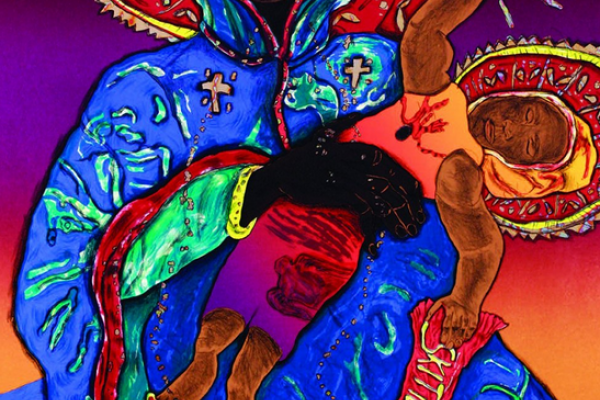Every once in a while, you read a book that you wish wasn’t necessary. Kelly Brown Douglas’ Stand Your Ground: Black Bodies and the Justice of God is one of those books.
Douglas writes in response to the murder of Trayvon Martin, tracing the intellectual and cultural genealogy of a “stand your ground” culture — one that polices our public ‘white’ spaces, and kills men and women of color who are in them. Sadly, as the deaths of Michael Brown and Freddie Gray show, our cops and our culture are still killing innocent people of color. We aren’t a post-racial culture at all.
Douglas’ tracing of the development of our stand your ground culture takes us back to Germania and an Anglo-Saxon myth of freedom and purity which, in early American culture, became intimately tied with a kind of white virtue. Through the perversion of the idea of “Manifest Destiny,” this racially exclusive myth grew increasingly religious and covered itself with a veneer of Darwinian science.
White Americans thought of themselves as God’s chosen nation, destined to bring civilization, Christianity, and the purity of the white race to the whole of the continent. People who didn’t fit into these narratives were excluded or exterminated, whether Native American residents or African-American slaves on whom the culture was built.
After slavery ended, Douglas interprets the betrayal of Reconstruction as re-imposing a kind of universal slavery on black people. White control of public space — land, bodies, and politics — was assured and constantly reinforced by the violence of lynching. Even today, racialized policing and discriminatory ‘welfare reform’ continues to marginalize and oppress the black population in America. Ultimately, this culture embodies what Lisa Sharon Harper calls "the lie" of American culture, that “black people are not fully human. In most crass terms — they are animals.”
Thank God Douglas doesn’t end there. Stand Your Ground takes a cruciform shape: we face the death of the cross in her depiction of the despair of a culture that kills its citizens, before rising in the resurrection hope of a black faith. This depiction of black faith is a description of what every variety of Christian faith ought to be.
This black faith looks at our culture of death with a paradoxical hope — one which recognizes its violent evil yet still believes in the God of history who has absolute freedom to transform everything. This faith is both deeply rooted in the black experience, and points beyond it.
Elements of Douglas’ historical analysis are problematic, particularly in her discussion of early America and tracing the historical beginning of a stand your ground culture. For example, some of the Puritan language about seeking to create a pure race in New England should be understood as echoing 1 Peter 2:9, which calls the church a “chosen race.” Douglas rather sees it as part of an early modern construction of an Anglo-Saxon identity.
When a book covers as large of a sweep of history and theology as Stand Your Ground, we can always pick nits. Still, these are nits only.
Beautifully, and terrifyingly, Douglas weaves her own fears into her academic analysis and experiences as a mother of a black son. We have created a society in which she is rightly scared for his life whenever he goes to the store — in which she needs to pray for his safety and fight for his freedom in court after an absurdist traffic stop. Her love for her son and longing for his freedom animate the book and ought to bring us to tears.
I wish Stand Your Ground wasn’t necessary. But it is. The first step to dismantling a culture of death like ours is talking about it honestly and, especially for white people like myself, accepting responsibility to change it.
I pray that Douglas’ work, both in this book and in her activism, will promote this change. And I look forward to working alongside her and others until, as she puts it, “the justice that is God’s is made real in the world.”
Stand Your Ground: Black Bodies and the Justice of God is out now, available at Amazon.
Greg Williams is Communications Assistant for Sojourners.
Got something to say about what you're reading? We value your feedback!
